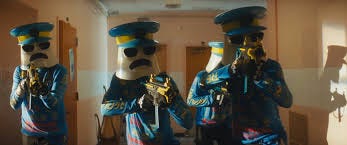AIn’t Love Grand?
My thoughts on Clone Cops, Companion, Love Me and the return of Swept Away (no, not that one)
By the time most of you read these words, the year 2025 will be barely four weeks old but even with 11 months left to go, it seems inconceivable that another film will come along as stridently annoying as Clone Cops, a low-budget would-be cult comedy that feels like someone took the most inexplicable sketch to ever appear in the final slot on SNL and stretched it out to a punishing 96 minutes without adding anything to it that even glancingly smacks at being amusing. In a not-too-distant future in which everything seems to be under the control of a multi-national concern known as NefariCorp (to give you an idea of the subtlety on display), a gang of criminals have holed up in a building to plan a big heist when they are set upon by a wave of cloned police officers (all played by Phillip Cordell) whipped up in a lab by the nefarious “One-Tank” Frank (Henry Haggard), an attack that grievously wounds their leader (Quinnlan Ashe) and ends up revealing shocking secrets that both rock their sense of reality and give them the keys to bring down the entire NefariCorp enterprise, assuming they can hold out against subsequent waves of increasingly wonky clone cops. Nothing about the film works at all—the performances demonstrate the kind of stiltedness one rarely sees outside of the plot-only sequences in lesser porn films, the direction by Danny Dones suggests a live-action cartoon as conceived by someone raised only only lesser Woody Woodpecker shorts and the screenplay by Cordell and Dones (who also directed) is a half-baked mess that is conceptually clumsy, structurally awkward and takes feeble aim at satirical targets that Robocop hit with far more effectiveness nearly 40 years ago. The film seems to be trying to approximated the off-the-cuff absurdism of a Quentin Dupieux project but even his least successful efforts have demonstrated more wit and ingenuity than this thing can even begin to muster up. Clone Cops is the kind of film that seems to have been devised in a lab in order to film up the less desirable time slots at less desirable film festivals and unless you have a perverse desire to sit through a “comedy” in which absolutely nothing about it works for even an instant, you can give it a complete pass, safe in the knowledge that you are not missing a damned thing
.Companion, on the other hand, is a much more successful stab at futuristic satire, though it is the kind of film that works best when you go in knowing as little about it as possible, even though the good folks at Warner Brothers have made sure to blow the first (but by no means last) of its big twists in the trailer. Suffice it to say, the film centers around couple Iris (Sophie Thatcher) and Josh (Jack Quaid) and, following a prologue in which we see them have a prototypical Meet Cute in a grocery store, we find them heading up to spend the weekend at a remote lake house with two other couples—Patrick and Eli (Lukas Gage and Harvey Guillen) and Kat and Sergey (Megan Suri and Rupert Friend), the latter being the rich and mysterious Russian businessman who owns the place and all its lavish trappings. Although things seem ostensibly happy on the surface, there are little suggestions that things are not quite right—the oddly dismissive way that Kat treats Iris, for example, or Josh’s post-coital behavior that is boorish even by clueless bro standards. Then things, as they say, take a turn and it is at this point that I will say no more, except to implore you to continue to avoid the trailer if you have managed to do so up to this point.
The good news is that while the marketing department for Companion has gone out of its way to blow one of the film’s big reveals, it turns out that writer-director Drew Hancock still has a number of additional twists up his sleeve that he is able to cannily deploy as the story goes on—better still, they are the kind that actually build upon what we have seen up until that point instead of just coming across as mere narrative rug-pulling. Additionally, over the course of what ostensibly appears to be a straightforward genre exercise, he manages to blend together dark humor, trenchant social commentary about the dynamics of contemporary relationships, a number of sly homages to its clear inspirations (none of which will be mentioned here, of course) and moments of gore that manage to come across as both grisly and crowd-pleasing. Best of all, it has a knockout central performance from Thatcher, who has shown a lot of promise in such previous films as The Boogeyman and last year’s Heretic (where she was the more worldly of the two young missionaries facing off against the diabolical Hugh Grant) and who is never less than fully convincing and sympathetic in what is ultimately a tricky role. Companion may not be a classic by any means—while the final stretch is fine, it lacks the burst of genuine inspiration that helped propel the story along up to that point—but it is a strange, funny and ultimately satisfying film that proves that good movies actually can open in the dead of January
.That said, I cannot imagine any time that would be suitable for the release of Love Me, an almost impossibly twee futuristic romantic drama that plays like a supremely hellish mash-up of a dumbed-down version of WALL-E and the infamously cloying/creepy comic strip Love Is. . .(the one with the two naked four-year-olds who are married). Following an amusing prologue presenting a speeded-up view of Earth from its very beginnings to what appears to have been a mankind-destroying world war, the story picks up some time after the end of humankind with a research buoy still floating in the water, hoping to connect with systems that no longer exist. Miraculously, the buoy crosses paths with a satellite in the air sending out a message chronicling the history of the planet to anyone who might happen upon it. Filled with a need to connect to something, the buoy pretends to be a life form and, after a number of false starts, the two systems finally find a common language and a relationship of sorts begins to develop between them. Not having any practical experience, the buoy decides to model its behavior upon a series of YouTube videos made by an aspiring influencer named Deja and her husband Liam (Kristen Stewart and Stephen Yuen, who also eventually provide the voices for the machines), who are constantly attesting to the perfect nature of their love while shilling for their sponsor, and the two go about trying to puzzle out the mystery of these strange feelings that they are now beginning to experience.
Written and directed by first-time filmmakers Sam and Andy Zuchero, Love Me is certainly ambitious for a debut feature and the sheer oddness of the concept is enough to inspire curiosity for a few minutes, I suppose, and that aforementioned prologue does demonstrate a certain amount of refreshingly mordant humor. However, once the buoy and the satellite have established their shared form of communication, the film spirals downward into an increasingly tedious mess that doesn’t seem to have any clear idea of whether it wants to be a sincere exploration of the mysterious need for entities to connect or a satire of nature of relationships in the era of social media and winds up failing at both. (The film seems to be setting up the potentially amusing conceit of machines trying to jump-start human-like relationships by using the most inauthentic version imaginable as a model, only to do nothing with it.) Beyond that, we never get any real understanding of the rules of this particular narrative, particularly the inexplicable shift to live-action in the final third that seems to exist only to give Stewart and Yuen some additional screen time. Love Me is a film that finds mechanical objects trying to embrace and understands the mysteries of humanity but utterly fails to do the same for itself
.Originally released in 1974, where it inspired an enormous amount of controversy while becoming a global box-office hit, Lina Wermuller’s Swept Away is now returning to theaters and its combination of sex and radical politics remains volatile even a half-century down the line. For those who are unfamiliar with it, it tells the story of Gennarino (Giancarlo Giannini), a mucho-macho sailor with decidedly communistic leanings and Raffaella (Mariangela Melato), the spoiled and self-absorbed wife of a rich businessman and the living epitome of capitalism at its crassest. The two meet on a cruise ship in the Mediterranean where she is one of the overly pampered guests and he is a member of the crew whom she immediately singles out for extra helpings of torment and abuse for no particular reason other than she can. One day, she insists that he take her out on a dinghy despite his protests regarding the potential dangers. Inevitably, the motor fails and they drift for days (at one point, he catches a fish for some much-needed food and she tosses it because it smells icky) before landing on a deserted island. Once there, Raffaella’s money and social standing are meaningless while Gennarino’s survival skills and machismo give him the upper hand for once and he begins ordering her about—essentially making her his slave in exchange for food and shelter. The twist is that she seems to be into being reduced to complete submission and falls in love with him, a potential relationship that becomes especially complicated when the possibility of a return to civilization and their previous standings becomes imminent.
Even in 1974, this combination of sadomasochism and politics—especially coming from a female filmmaker and especially from one who was clearly a leftist but not exactly a feminist—raised hackles and it is impossible to imagine what a contemporary viewer, knowing nothing about either the film or Wertmuller (who, with her follow-up project The Seven Beauties, would become the first woman nominated for the Oscar for Best Director), might make of it. I can’t say that I regard it as a masterpiece in the way that some people did back in the day—I think that the set-up goes on a little too long and the ending is too didactic for its own good, focusing entirely on the political side of the situation involving Raffaella and Gennarino and casting the undeniable emotional aspects aside—but it remains a fascinating work nevertheless. At a time when most American films shy away from both eroticism and radical politics, it is refreshing to see one embracing both concepts as completely as this one does. (When it was remade in 2002 by Guy Ritchie as a vehicle for then-wife Madonna, the political aspect was removed entirely, which proved to be the worst idea of a project that seemed to consist of nothing but bad ideas.) While the concept is undeniably problematic and always seems right on the edge of teetering into something akin to what one might find in the letters column of a socialist-leaning edition of Penthouse, Gianni and Melato somehow make it work thanks to their undeniably charismatic performances and equally obvious sex appeal. Although still in the running for the title of Worst First Date Movie Ever, Swept Away is a film of remarkable audacity that remains as vital and provocative—and, lets face it, sexy—as ever and anyone who still clings to the notion that the Fifty Shades franchise was bold and daring owes it to themselves to check it out and have their minds blown.








It’s clear that Clone Cops didn’t work for you, but calling it ‘stridently annoying’ and comparing the acting to ‘lesser porn films’ feels like you were gunning for the harshest insults possible rather than engaging with the film on its own terms.
Plenty of cult comedies have been dismissed as ‘punishing’ or ‘half-baked’ in their time, only to find an audience that actually gets the joke. Who knows—maybe in a few years, Clone Cops will be one of those little films people passionately defend. Or maybe it’s just not your thing. Either way, it’s wild to see a low-budget indie get such a vitriolic takedown. Almost makes it sound… interesting?